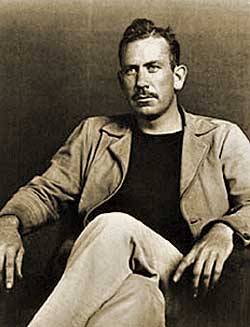Great Throughts Treasury
This site is dedicated to the memory of Dr. Alan William Smolowe who gave birth to the creation of this database.

John Steinbeck, fully John Ernst Steinbeck
American Author known for his Pulitzer Prize-winning novel The Grapes of Wrath, Of Mice and Men and East of Eden. Winner of Nobel Prize in Literature.
"A plan is a real thing, and things projected are experienced."
"If then this tendency toward collectivization is a mutation there is no reason to suppose it is for the better. It is a rule in paleontology that ornamentation and complication precede extinction. And our mutation, of which the assembly line, the collective farm, the mechanized army, and the mass production of food are evidences or even symptoms, might well correspond to the thickening armor of the great reptiles—a tendency that can end only in extinction."
"Now, there are many millions in their sects and churches who feel the order, 'Do thou,' and throw their weight into obedience. And there are millions more who feel predestination in 'Thou shalt.' Nothing they may do can interfere with what will be. But 'Thou mayest'! Why, that makes a man great, that gives him stature with the gods, for in his weakness and his filth and his murder of his brother he has still the great choice. He can choose his course and fight it through and win."
"Critics are the eunuchs of literature. They stand by in envious awe while the whole man and his partner demonstrate the art of living."
"I know three things will never be believed - the true, the probable, and the logical."
"Can a man think out his life, or must he just tag along?"
"This is the thing to bomb. This is the beginning—from "I" to "we". If you who own the things people must have could understand this, you might preserve yourself. If you could separate causes from results, if you could know that Paine, Marx, Jefferson, Lenin were results, not causes, you might survive. But that you cannot know. For the quality of owning freezes you forever into "I", and cuts you off forever from the "we". "
"Death is a personal matter, arousing sorrow, despair, fervor, or dry-hearted philosophy. Funerals, on the other hand, are social functions. Imagine going to a funeral without first polishing the automobile. Imagine standing at a graveside not dressed in your best dark suit and your best black shoes, polished delightfully. Imagine sending flowers to a funeral with no attached card to prove you had done the correct thing. In no social institution is the codified ritual of behavior more rigid than in funerals. Imagine the indignation if the minister altered his sermon or experimented with facial expression. Consider the shock if, at the funeral parlors, any chairs were used but those little folding yellow torture chairs with the hard seats. No, dying, a man may be loved, hated, mourned, missed; but once dead he becomes the chief ornament of a complicated and formal social celebration."
"The words are meaningless except in terms of feeling. Does anyone act as the result of thought or does feeling stimulate action and sometimes thought implement it."
"The writer is delegated to declare and to celebrate man's proven capacity for greatness of heart and spirit - for gallantry in defeat - for courage, compassion and love. In the endless war against weakness and despair, these are the bright rally-flags of hope and of emulation."
"There's an awful lot of inactive kindness which is nothing but laziness, not wanting any trouble, confusion, or effort."
"If everything is coming your way, you are probably in the wrong lane. Adversity and defeat are more conducive to spiritual growth than prosperity and victory."